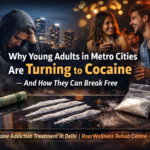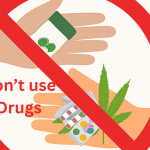Addiction is a disease—and a progressive one at that—that is well established. The illness can be roughly divided into three stages: the middle stage, the late stage, and the early stage. Certain behaviors and cognitive mechanisms distinguish each stage. The client and their family receive assistance in addiction recovery in determining the client’s current stage of addiction. The last stage is typically when families approach the Rehabilitation Centre in Delhi for addiction.
The individual begins to sneak drinks and drugs early on. Additionally, he becomes preoccupied with alcohol and drugs and spends time considering methods for acquiring, utilizing, or concealing his substance abuse. Then, in order to achieve what is commonly referred to as “chasing the high,” he begins to alter his drinking habits by inhaling the beverage quickly as opposed to sipping it, or by injecting the drug directly, for example. Additionally, he will begin to avoid mentioning his use and begin to experience memory lapses. He is unable to recall specific events or periods of time while under the influence because of these blackouts. This, in turn, suggests a greater drug tolerance. The advice of well-wishers may include suggestions for drug and alcohol detoxification facilities. After that, he’ll start to feel the need to use before and after social events. This suggests a diminished capacity for social integration (at parties, weddings, and other events); and frequently comes with isolation as well. He then engages in “relief drinking,” which causes him to become uncomfortable in situations where he is not consuming alcohol or drugs.
The user loses control over his or her use in the middle stage. Along with an increase in the frequency of relief drinking and substance abuse, the value system begins to be impacted, and there is dishonesty regarding the use and its consequences. The user will attempt to conceal or fabricate their use in a variety of ways. In order to shield him from the consequences of his use, others frequently lie as well. He now has what is known as a “morning craving,” and as soon as he wakes up, he needs a drink or to use his drug. He tries periods of forced abstinence or attempts to change his location to control his use, both of which fail because he has lost control. Others around him oppose his utilization.
There is a lot of aggression and rationalization. Cognitive distortions like rationalization, minimizing, and diverting are addressed in alcohol de-addiction treatment. This is frequently a component of a larger issue with denial, a primitive form of self-defense against the harsh reality of the addict’s addiction and its losses. Recovery from addiction is severely hampered by this denial. Additionally, he devalues personal relationships and cultivates unreasonable resentments. He frequently loses his job because he can’t keep it. The majority of his drinking and drug use occurs by himself at this point. In an effort to cover up feelings of low self-esteem, grandiosity is evident. Once more, he attempts to exert authority, but fails. Eating poorly is common. Sexual drive suffers.
He starts going on long binges in order to control his shaking and trembling at the end of his drug and alcohol addiction. Cognitive processes and thinking are affected. Irrationality is in control. Persistent remorse replaces the previous stage’s sense of guilt. A significant component of addiction recovery is addressing this guilt. Tolerance decreases and emotional instability rises. Moral standards and physical health suffer significantly. At this stage, he is often admitted to a mental hospital or a drug and alcohol rehab facility for treatment. He has exhausted all excuses at this point, and if assistance is not sought, death is typically the outcome.
It is essential to acknowledge that not all symptoms must occur at each stage in order to progress to the next. In addition, they might not occur in the same order as previously mentioned. However, the course of the addiction disease is predictable, and if it is not treated, the consequences can be fatal. It’s important to remember that an addict can get arrested at any stage of the disease and enter addiction recovery.
In addition to detox, multiple treatments are required for alcohol addiction treatment. Before beginning any treatment, detoxification is an essential first step because it aids in the elimination of alcohol and drugs from the body.
Individual counseling, group therapy, and psychoeducation on the biological, psychological, and social effects of alcohol dependence (bio-psycho-social model) are all offered at Luxury Rehab in Delhi Depending on the need, our specialists are well-equipped to carry out a variety of treatments, including medical treatments or empirically validated psychological treatments for substance abuse like CBT, IPT, supportive therapy, and group therapy. Hope Trust adheres to the 12-step program, which is recommended by the WHO for both the treatment program and its completion.











